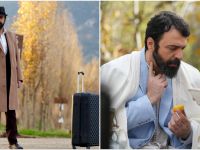Saleh Bakri is in Paris, for the first ever Palestine Film Festival to be held in the City of Lights. The festival opened with "When I Saw You", the award-winning film by Annemarie Jacir and starring Bakri.
Jacir-Bakri collaborations are hugely successful, with 2008’s “Salt of the Sea,” the first feature film by a female director from Palestine, nominated for the Golden Camera and Un Certain Regard awards at that year’s Cannes Film Festival. “When I Saw You” was Palestine’s 2013 Oscar entry for best foreign-language film. It won a number of international awards, including the Special Jury Prize at the Oran Festival of Arab cinema in Algeria that same year.
Jaffa-born Saleh Bakri caught up with Al-Arabiya and spoke a bit about his involvement in Palestinian film.
“Palestinian films resemble life itself,” said Bakri. “There’s occupation, oppression, war, death, exile, but also hope, happiness, dreams of freedom. The festival is also a great opportunity to meet a new generation of artists, producers, and other Palestinian actors from all around the world.”
Bakri comes from an acting family - his father is renowned Jenin film director Mohammed Bakri and brothers Ziad and Adam are also actors. Born in Israel, Bakri was one of just two Arabs to study drama in Ramat Gan, Tel Aviv. Initially he did not want to be an actor, but said that he used his acting to combat his fears, "because fear is like a little death."
From an early age, he was subject to constant security checks, restrictions and discrimination in all walks of life, from finding accommodation to jobs. “The arrogance of Israeli occupiers and how they look down on Palestinians is very oppressive in itself too,” Bakri told Al-Arabiya. “I learned how to use satire to try and ridicule the situation.”
As he grew older he “understood the importance of cinema and drama in changing people and society, and eventually achieving justice. It was a vehicle by which we could talk about the occupation and colonisation. A revolution without art has no soul.”
“The problem with Palestinian art is that we don’t have a united country,” he said. “Simply moving from one territory to another can be hugely difficult. Occupation affects the arts through and through.”
“I take a moral position on all the work I do. I refuse to participate in a production with a viewpoint I don’t agree with. This would include any funded by the Israeli government. But if there are Israeli artists who accept my terms and declare that they’re not going to get any financial support from Israeli institutions, and don’t want their film to be presented by the Israeli apartheid regime, then I’d work with them.
“I not only support the cultural boycott of Israel, but also want people to end economic dealings with it. Criminalizing Israel and turning it into a pariah state on the world stage is the way forward for justice for the Palestinians. I also hope that Palestine joining the International Criminal Court will help in that.”
Bakri has deliberately turned down Hollywood films and even a James Bond movie, because the films promoted Israel or Israeli weapons in some way.
Although Bakri has Israeli citizenship, he is clear about his identity.
“Being Palestinian gives me strength to talk about and tell the story of an oppressed people. I’ll always be Palestinian and nothing else.”








